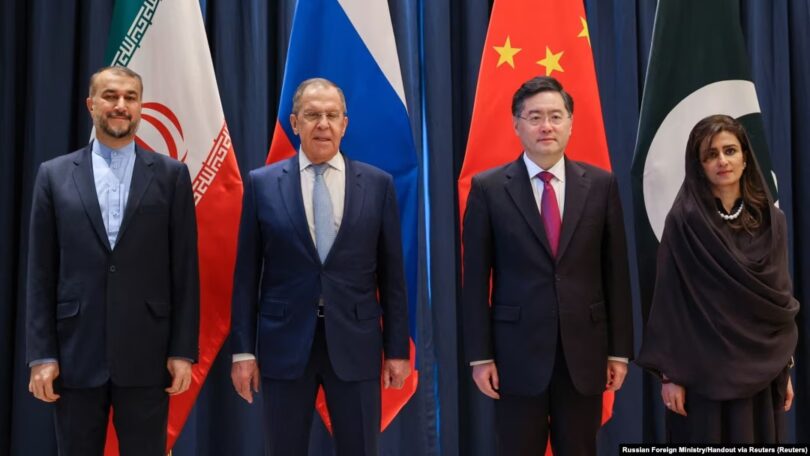The top diplomats from Russia, China, Iran, and Pakistan attended a conference in Samarkand, Uzbekistan to discuss regional security and the situation in Afghanistan. During the huddle of the Quad nations, the foreign ministers of Afghanistan’s neighboring countries stressed that cooperation with Afghan authorities is essential to preserve political stability, avert a humanitarian crisis, to counter menaces of terrorism and drug trafficking emanating out of Afghanistan. The forum called on the international community to firmly support Afghanistan to combat terrorism and urged the United States to live up to its commitment to the country. The forum reaffirmed its pledge to respect the independence, sovereignty, and territorial integrity of Afghanistan, along with the choices made by Afghans.
The people of Afghanistan had experienced unimaginable miseries and vicissitudes because of persistent conflict and violence in their country over the past decades, while the international community and neighboring states including Pakistan, Iran, China, Russia, and Central Asian Republics wanted to preserve peace and stability in the war-hit nation through continued engagement, and cooperation with the interim Afghan government because conflict and violence will not only affect the Afghan nation but likely to undermine regional development and cause serious security issues in the region and beyond. Therefore, the global community and regional stakeholders support the idea of a broad base and consensus political system that ends violence and ensures peace and stability in war-hit Afghanistan. The global community hopes that Afghanistan’s interim authority will actively work to meet the needs of its people and the expectations of the international community for an open and inclusive political setup that guarantees lasting peace in Afghanistan. Similarly, the regional nations persistently urge the Afghan interim authorities to protect the basic rights and interests of all Afghan people, including women, children, ethnic groups, and religious minorities in the country.
Apparently, the recipe for a peaceful, stable, and prosperous Afghanistan is not much complex and every loyal individual, government, and entity has explicitly told the Afghan interim government and other combatant groups about it. Still, the warring Afghan factions are unable to work for the more considerable benefit of the Afghan nation by surpassing their political, ethnic, and communal interests for the time being. Over the past one and a half years, the Taliban regime made no attempt to conceive political inclusiveness and economic stability, rather it imposed a ban on girls’ education beyond sixth grade, women’s employment, females’ tourism, and travel in the country. Similarly, unrestricted movement and regrouping of terrorist outfits in the country have caused serious security risks for other nations in the region.
In the current scenario, Afghanistan is facing extreme economic, social, and secuirty challenges to its survival, while an all-time humanitarian crisis continuously persists in the country. Pakistan an all-weather supporter of the Afghan nation is strongly advocating for the well-being of the people of Afghanistan at all available forums. Pakistan is actively engaged with Afghan authorities at the government, parliamentary, and business levels while people-to-people contacts are being encouraged to explore maximum avenues of bilateral cooperation between both nations. Pakistan has been continuously urging the global community to delink its humanitarian assistance from political issues and remain engaged with the Afghan interim government as no peaceful and equally acceptable solution could be achieved without engagement, talks, and dialogue with Afghan rulers. At the same time, the Taliban must understand that no nation can survive in isolation and that no government could exist without support from its people. Therefore, Afghan interim authorities must respond to global calls by upholding the public interest and addressing the grievances of its close neighbors, promoting peace, trade, and tourism, that is the only way forward toward a peaceful and stable Afghanistan.







